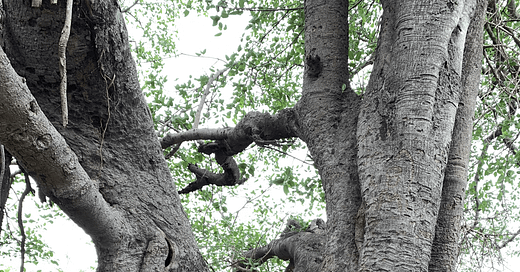this post is a two-parter. the first part started on a slow sunday morning while i was studying a course called fundamentals of ecology. the second part is a question i’ve been asked all my life: why don’t you eat garlic, onion, and potato?
now, these two might seem completely unrelated—like they live in separate universes. but hey, the human brain is designed to connect dots where none seem to exist.
part 1:
it was 11:11 am on 11/05/2025. i was doing some data entry and decided to simultaneously catch up on a module about plant and animal interactions.
now to understand the origin, we have to zoom way back—like single-celled-organisms-back. life began after water formed on earth, and from the soup of early elements, single-celled organisms came into existence. these eventually evolved into multicellular organisms, and after a couple of round of evolution... there were plants! (underwater ones, at first.)
aquatic plants absorbed nutrients and water directly from their environment, in a fairly simple way. but as evolution pushed life onto land, plants had to figure out new survival strategies—like how to get water and nutrients from the ground while staying rooted in one place. that’s where the magic of photosynthesis came in.
(quick side thought: photosynthesis as a concept existed even before land plants evolved)
photosynthesis allowed plants to cook their own food using sunlight—an independent move, which i personally find inspiring. to support this lifestyle on land, plants evolved two internal systems: xylem (to carry water and minerals up from the soil) and phloem (to move sugars around).
while roots might seem like they do most of the heavy lifting, i think of the plant more like a startup team: everything works together and shares resources. and like any smart team, they save for hard times. plants store sugars and starches in their roots, flowers, or fruits—wherever it makes sense for their survival.
you’ve probably seen bees or butterflies nectaring on flowers—those sugars are a sweet bribe in exchange for pollination services. when starch is stored in roots, those roots can eventually become a site for the root vegetables. i like to think of these root veggies as plant powerhouses or emergency banks.
so that got me wondering: what are plants prepping for in life? —night time and winters, plants tap into their stored energy to survive. not too different from how we save for a rainy/snowy day.
(quick thought: during the day, they photosynthesize and produce oxygen. but at night, many plants actually consume oxygen back and release carbon dioxide—kind of like us. a few special plants, do a modified version of photosynthesis that works at night too.)
part 2:
this is where the dots started connecting in my head.
when plants store a lot of sugar and starch in the roots, it’s not just food for them—it’s literally their survival mechanism. so when humans harvest underground vegetables like garlic, onion, and potato, we're not just taking a snack. we’re uprooting the plant completely. it dies. in contrast, when we pluck vegetables like tomato, a spinach leaf, or a fruit, the plant often continues to live and grow. still an impact (not justifying it or comparing), but it’s a smaller impact.
jain philosophy, allows an individual to choose on what to eat with awareness and perhaps some compassion. (although, now it’s just become a fear game).
what made sense to me:
i’m a jain who eats root vegetables—occasionally and in moderation. not necessarily because of religious rules, but more because that’s the amount my body peacefully digests. more than that, and let’s just say i become a one-woman explosion.
what often surprises especially those who consume meat—is when i say not eating meat is a choice. the conversation quickly flips into: "oh, so you think plants don’t die when you eat them?" or "why this bias between plants and animals?" and honestly, i get the question. but to me, it’s not about pretending there’s no impact—it's about reducing harm where i can, being aware of how life works, and choosing what feels aligned. it’s less about drawing a perfect ethical line and more about walking the one that makes sense to me.
next, i’m hopping on to:
mosses—wondering if i could eat them if i were ever lost in a forest with limited resources. i am also wondering if they might work as nature’s signboards, helping me navigate the wild.
special mention via substack:
kuhelika bisht & nishant for introducing this course that simplifies ecology
everybody else who kept asking, ‘why do jain not eat… (list)’ :p



